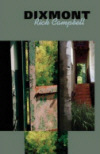Dixmont
Rick Campbell is a friend of mine, someone whose capacious heart and mind have served me as a touchstone of the genuine for over a decade. As director of Anhinga Press, as well as founder and director of the Florida Literary Arts Coalition (FLAC), Rick has performed immense and selfless service for poetry both in Florida and nationwide. For years he has advocated for good poetry, worked to make poetry a larger presence in our culture, and supported the work of his fellow poets. His work promoting other people’s writing has been so significant, in fact, that his own fine poetry, while not exactly overlooked, has garnered less attention than it deserves. His new book, Dixmont, outshines his previous collections by a long shot; it is a powerful, honest, finely-crafted book of emotionally-honed poems whose cumulative effect is simultaneously harrowing and life-affirming. Quite simply, Dixmont is the real thing, a genuine contribution to our poetry.
Rick Campbell is a friend of mine, someone whose capacious heart and mind have served me as a touchstone of the genuine for over a decade. As director of Anhinga Press, as well as founder and director of the Florida Literary Arts Coalition (FLAC), Rick has performed immense and selfless service for poetry both in Florida and nationwide. For years he has advocated for good poetry, worked to make poetry a larger presence in our culture, and supported the work of his fellow poets. His work promoting other people’s writing has been so significant, in fact, that his own fine poetry, while not exactly overlooked, has garnered less attention than it deserves. His new book, Dixmont, outshines his previous collections by a long shot; it is a powerful, honest, finely-crafted book of emotionally-honed poems whose cumulative effect is simultaneously harrowing and life-affirming. Quite simply, Dixmont is the real thing, a genuine contribution to our poetry.
These poems address a variety of subjects including fatherhood, politics, marriage, baseball, illness and love. Campbell has managed to weave these wide-ranging poems into a cohesive book whose whole is larger than the sum of its parts. The poems for his daughter and wife, which make up the emotional center of the collection, are deeply moving; they are also, I think, poems which break new ground in their openness to pain and their articulation of the speaker’s clear commitment to love as it is experienced in daily life:
Sometimes, still, she wakes and says,
Daddy, I have to go to the bathroom,
And I pick her up. She’s warm.
She wraps her arms around my neck,
Her legs around my waist, and I carry her.
(“A Poem for Della”)
When has the daily love of a father for his young daughter been phrased with such understated accuracy and power? Poems that evoke other kinds of love, for wife, for mother, even (in far more compromised terms) for father, are equally powerful, as are the poems dealing with Campbell’s harrowing experiences with throat cancer.
These personal but never private poems form the pattern that sets the landscape of the book; they are deepened and clarified by their contrast with the more outward-gazing (but still deeply personal) poems of witness (they are more than merely “political” poems) as well as poems celebrating baseball (the only poems in the book that don’t touch me). The poems of witness, powerful on their own, deepen the sense of vulnerability, the vividness of each moment, that characterizes Campbell’s more overtly personal poems of family love:
I want to claim that I don’t understand genocide,
That I have not read history; that I don’t
Understand the circulation of the blood
And how we can all die from its
Spilling on the ground
From hacked off limbs…
(“Poetry Makes Nothing Happen”)
This is the awareness the father holds “below the heart, where things are tight” as he comforts or plays with his daughter, reminding himself “there is no excuse/ for not giving the world, all your blood/ every inch of skin and bone, for your child” (“Fair Warning”).
Finally, in his poems of nature, of place, Campbell is able to bind the personal and the public together in fresh images and metaphors that work vividly on their own but also unite the book as a whole, showing us a man in the world we all share as well as a particular man in his own world, living with the consciousness of the tenuous brevity of everything he loves yet blessed daily with joy:
Now I measure the past by how much
I remember. Measure distance
by my drive from town. Measure the sun
by its height in my windshield.
Measure joy by each time the gate
swings open and my daughter
runs up, flanked by dogs.
(“Time Running Out on the Millennium”)
Dixmont is a stunning collection.





